Unearthing memories: BBC’s Maigret and rural Canadian violence
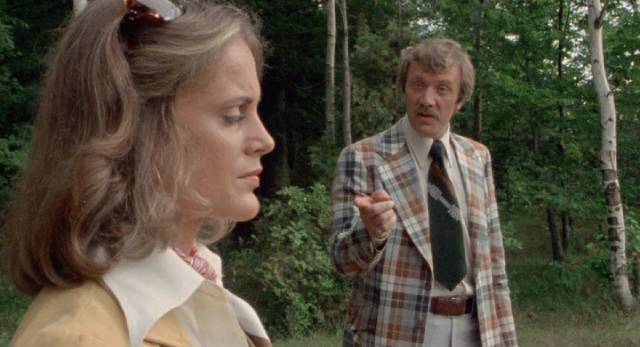
A theme I’ve occasionally returned to here over the years is memory and its vagaries. The more distinct a memory of something watched long ago, the greater the risk in revisiting it; a new encounter has the potential to destroy fond memories … a movie may turn out to be radically different from the way memory has shaped it. The corollary is that occasionally a memory may be confirmed, or perhaps the new encounter will reveal something new of value. It can be disorienting to discover that memory differs radically from the actual movie, though that’s not necessarily a bad thing – Nicholas Meyer’s The Day After (1983) turned out to be much better than I remembered from a single viewing decades ago. But the risk is always there that something fondly remembered will look like an embarrassment when seen again. So I’m always a bit cautious.
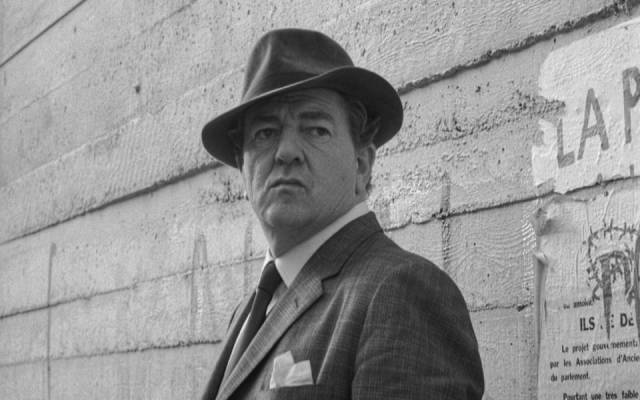
Maigret: The Complete Series (1960-63)
A couple of years ago I got sucked into the world of Georges Simenon’s famous detective Jules Maigret after by sheer chance reading a collection of stories and novellas. The character and his world appealed to me and I ended up buying a massive DVD set of fifty-four feature-length French television adaptations and downloading a file containing more than sixty of the novels (although I did slow down a bit, I’m currently on number forty-nine, with another fourteen to go). Through all this, at the back of my mind, was a childhood memory: in 1960, the BBC began a series based on the novels which apparently premiered the day after my sixth birthday and ran for four seasons. Although I was very young and wouldn’t have had much of a grasp of these stories about a French police inspector, one thing did stick.
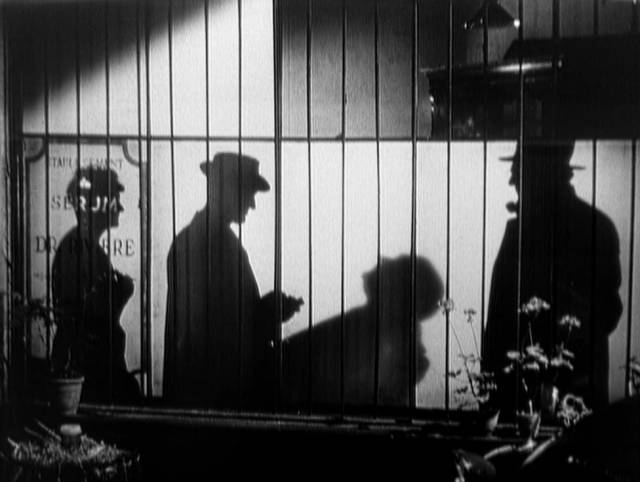
Maigret was played by an actor named Rupert Davies and in later years whenever I’d see him in something – he did a lot of television and had supporting roles in many movies: he was the original George Smiley in Martin Ritt’s The Spy Who Came in from the Cold (1965) and showed up in various horror movies in the ’60s – I’d always feel that little jog of memory: “there’s Maigret”. Although I didn’t know it until recently, Simenon himself liked Davies in the part, saying that here was his Maigret.
Given that it was made between 1960 and 1963, it didn’t seem very likely that the series would ever be more than that single sliver of memory. Many classic BBC series have been lost or survive only in fragments. One reason was the corporation’s habit of erasing original broadcast tapes so they could be reused – tape was expensive back then – and many programs were recorded live so those masters were the sole source. Occasionally, they would film the broadcast off a monitor so there was something to sell to other markets or to use for an encore transmission, but even those were not archived in any systematic way (which is why only the first two parts of Nigel Kneale’s first Quatermass serial still exist).
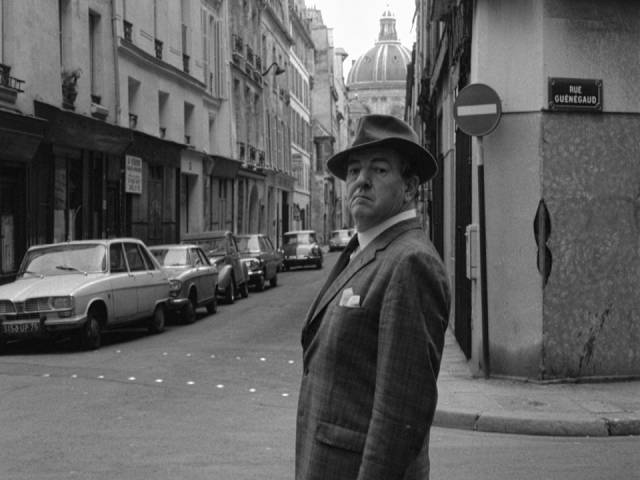
Which is why I was recently surprised to discover that Network in England had released the series and that the eleven-disk set included every episode, plus a feature-length follow-up made in 1969. Even more surprising, it was released on Blu-ray. There could be no hesitation – I immediately ordered the set and when it arrived there were further surprises.
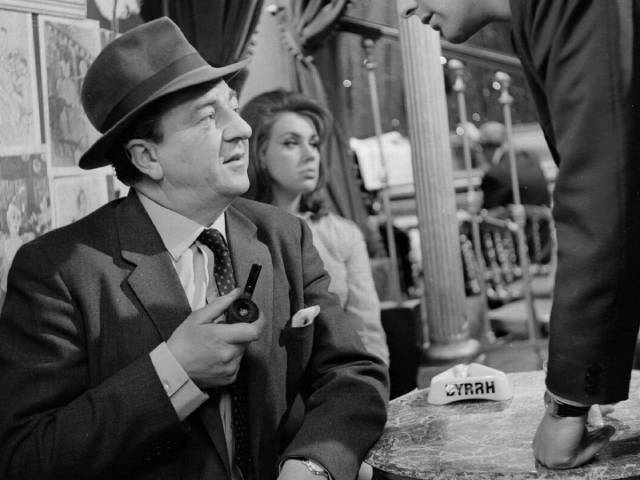
The hi-def masters had been made from the original “telerecordings” (known as kinescopes in the U.S.), meaning they were filmed off a monitor at the time of their original broadcast. In those days, TV was pretty primitive compared to what we’re used to now – only 405 lines of resolution, and somewhat glitchy. According to Network’s notes, some digital clean-up was done to reduce things like combing, but there’s only so much you can do with a weak source. My heart sank a bit as I watched the first episode, Murder in Montmartre (strangely, also the first episode of the Bruno Cremer series, although the source is the thirty-sixth novel). The image was a mess, soft and smeary, breaking down every time the camera moved. Not an auspicious start.
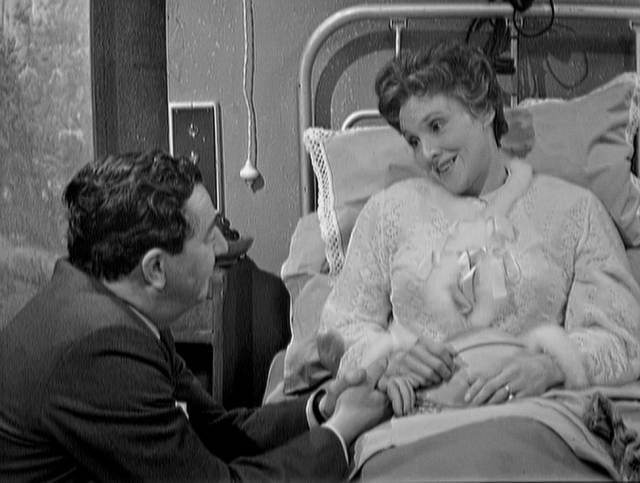
But beneath the surface issues, there was an unexpected surprise. Much of the show had been shot on film (usually used only for brief inserts in BBC dramas at the time, but here making up a large part of the episode) and, even more unexpectedly, it had been shot on location in Paris. This was not just a matter of a few establishing shots to provide a veneer of authenticity; the cast were roaming around Paris streets, with many sequences looking like a movie rather than a cramped TV show. There were still signs of budgetary limitations – bumpy camera moves, occasional flubbed lines kept in because they couldn’t afford another take – but the show was surprisingly cinematic.
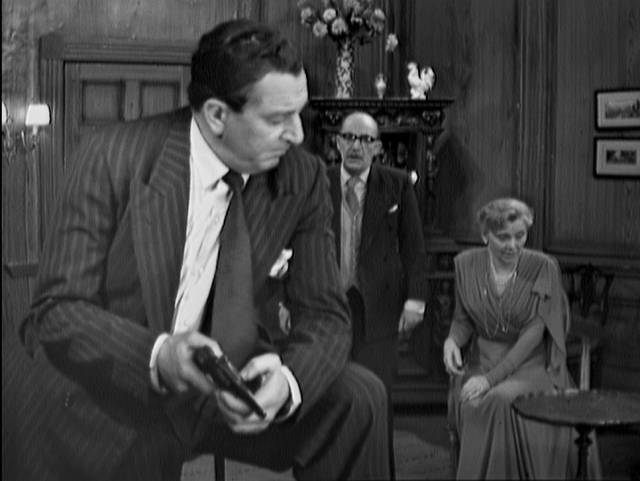
As I watched more episodes, each based on one of the books, it became apparent that the writers had done a remarkable job of compressing Simenon’s short novels into a mere 50-odd minutes. Most of the narratives remained intact, even if a certain level of detail was lost. The series is very faithful to the source, and even though all the actors are English, with only a few trying for a French accent, the flavour of the books is captured most of the time. And there’s Rupert Davies at the centre of it all, calm, thoughtful, puffing on his ubiquitous pipes as he pieces together the stories behind various crimes. He has much the same undemonstrative gravitas that Cremer brought to the role.
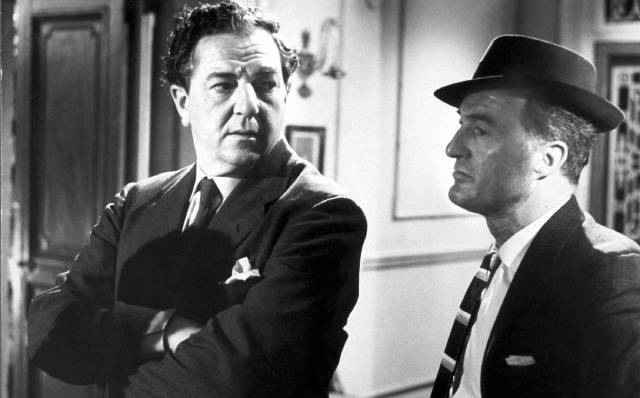
Of course, none of this was a part of my trace memory of the series – why did I carry that memory of Rupert Davies as the character for sixty years? – so watching all fifty-two episodes plus the feature-length Maigret at Bay (1969) was something of a fresh discovery which fit snugly into the context I’ve developed over the past two years. And, although the technical quality is uneven, many episodes look remarkably fresh and detailed thanks to the fine quality of the photography – even the interiors at the Palais de Justice and various apartments and bistros are well-designed and shot with an eye for atmosphere. But what I found most pleasing was the extensive location work, not just in Paris but out in the countryside and, particularly, on the canals which play a large part in many of the novels. This seems so much richer and more expansive than many British television shows of the period and preserves a fascinating visual record of France from the same era which saw the nouvelle vague directors shooting out on the streets.
I wish that Network had included some kind of retrospective documentary, but it’s a real gift to have the entire series in such an eminently watchable form.
*
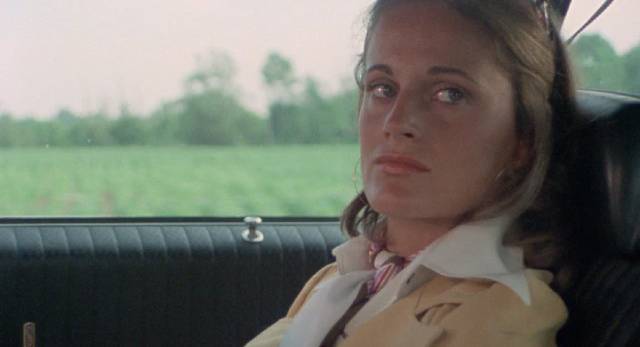
Sudden Fury (Brian Damude, 1975)
Speaking of the vagaries of memory – I have a small stack of Canadian and Quebecois movies from the 1960s and ’70s that I’ve been meaning to get to for a couple of months (thanks to several Vinegar Syndrome partner labels), though as usual I find myself distracted by other things. But after tracking down and watching Zale Dalen’s Skip Tracer, I finally took a look at Sudden Fury (1975), the sole feature writing-directing credit of one Brian Damude. A quick check of my records shows that I saw this on its original theatrical release, and gave it a no-star rating. Having absolutely no memory of the film (which I saw between John Huston’s late masterpiece The Man Who Would Be King [four stars] and Tim Burstall’s Aussie sex comedy Alvin Purple, which I gave two stars for some reason), I can’t say why I dismissed it out of hand – reverse chauvinism? the sheer Canadian-ness of it? Looking back, I often find my evaluations inexplicable now and this is a case in point.
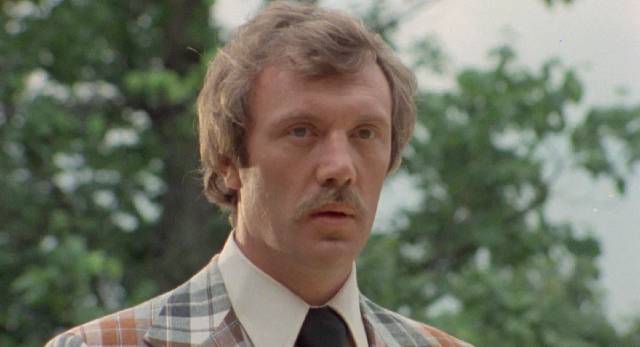
Sudden Fury is a modest low-budget thriller which reminds me of the kind of things being made in Australia around the same time – in particular the thrillers scripted by the prolific Everett De Roche: Patrick, The Long Weekend (both 1978), Snapshot (1979), Harlequin (1980), Road Games (1981). Although those and other movies from the Australian resurgence in the ’70s and ’80s came a few years later, and so couldn’t have influenced my opinion of this particular movie, I am reminded of my frustration back then that Australia seemed to have a better grasp of commercial genre cinema which reflected a distinctive national character. It seemed that Canada was perpetually hampered by our proximity to the States. While a lot of Canadian talent headed south where better money could be made, those who stayed too often struggled to emulate the American mainstream on inadequate budgets … something encouraged by the tax shelter incentives which began to boost production shortly after Damude made his movie.
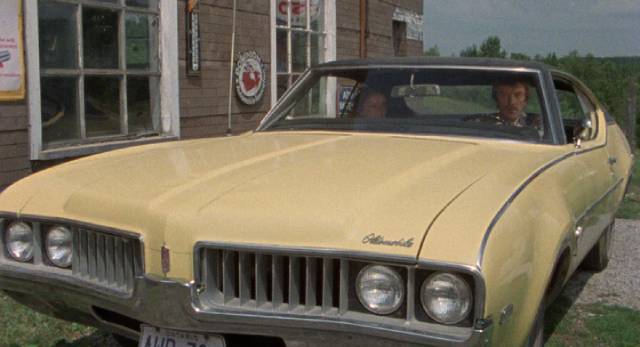
While it’s easy to see the plot of Sudden Fury taking place somewhere else – the Midwestern States, Australia, England – its “flavour” is determinedly Canadian. The cast play a big part in this – those Canadian accents and the understatement even when things get nasty (an instinct for politeness at all times). Perhaps it was this tone which made me dismissive back in 1975; the sheer familiarity and ordinariness of these people ran counter to the violent behaviour on display – this kind of thing was easier to take seriously in other places. To be honest, watching it again almost five decades later, even though I could now see more clearly the quality of Damude’s filmmaking, I nonetheless found the characters, particularly the “hero”, irritating at times. There was a reticence, a lack of the decisive action which I’d expect in a story like this – something which culminates in a surprisingly downbeat and inconclusive ending. The characters irritate because they don’t behave like movie characters; I may have found this dissatisfying back then, but can see it now as something more unusual, something which subverts deeply ingrained genre expectations.
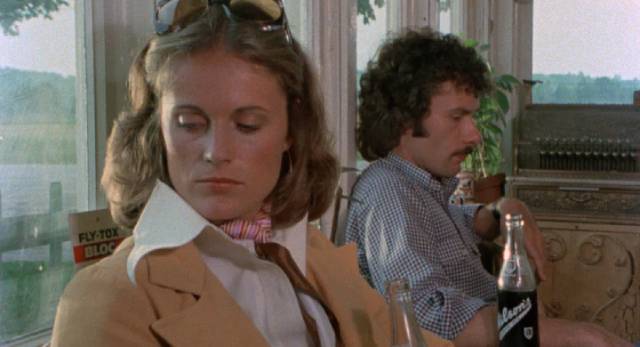
The movie begins with a middle-class couple whose marriage is obviously under stress. Fred (Dominic Hogan) sweats desperation, while Janet (Gay Rowan) keeps a cool distance. He has plans which apparently always come to nothing, while she’s successful and controls the money. On a trip out of town, he takes a diversion and stops in the middle of nowhere to show her a piece of land where he’d like to build a small “resort motel”. He just needs her to kick in $40,000. She’s not interested, and he becomes increasingly angry. During an argument, he swings open the door of the car parked on the shoulder and forces another vehicle to swerve dangerously.
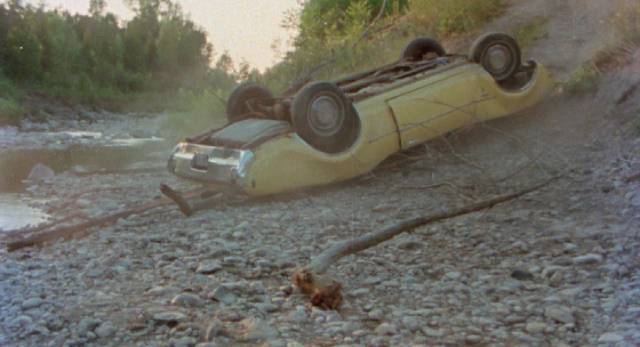
Al (Dan Hennessey), the other driver, calls him an idiot and Fred is ready to start a fight to vent the anger he feels towards Janet, but she manages to calm him. A bit later, they both stop to fill up at an isolated country gas station and Janet apologizes. Fred is still angry and abusive and Al and the old gas station owner (Eric Clavering) watch the couple drive off. In the car, the argument continues and Fred finally gets Janet to admit that she’s having an affair and is pretty much done with their marriage. Furious, Fred stops watching the road and they crash through a barrier. He’s thrown clear as the car flips onto its roof beside a river. With Janet badly injured and bleeding, hanging from her seatbelt, Fred immediately sees an opportunity – with her dead, he gets all the money. So he walks away.
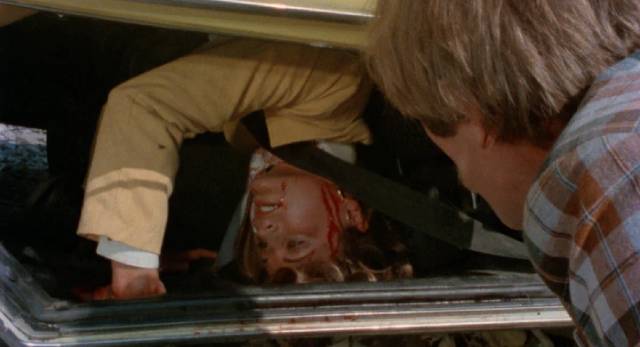
But he doesn’t get far before Al drives by and sees the wreck. As he tries to help Janet, Fred pulls a wire loose in Al’s engine. When Al gets Janet into the back seat, he discovers that the car won’t start and sets off on foot to look for help. Fred, thinking quickly, reattaches the loose wire, tries to smother the barely conscious Janet and, seeing Al returning, releases the brake and tries to push the car down the slope towards the river. Al manages to stop the car, but doesn’t try the ignition again. Believing he’s immobilized, and knowing that Fred is still lurking around, he can’t risk leaving Janet again to walk in the other direction … but he can’t help her either and ends up sitting holding her hand while she slowly dies.
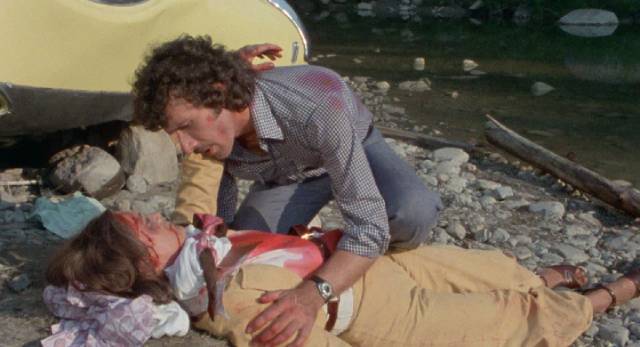
Fred, meanwhile, has found his way to a farm. For a loser whose schemes always fall through, he acts quickly to manufacture a narrative to exonerate himself and put all the blame for Janet’s death onto Al. First, he slips into the farmhouse and disables the phone – he doesn’t want the police to show up too soon and maybe save her life – then he plays up his own injuries and staggers into view of the farmer, Dan (David Yorston), out by the barn. He tells a desperate story about a crazy guy who forced him off the road and pleads for help to save his injured wife’s life. Playing up the threat of Al, he convinces Dan to take a rifle as he heads off in a truck to the crash site. Dan’s wife Laura (Hollis McLaren) tries to call for help, but the phone is dead.
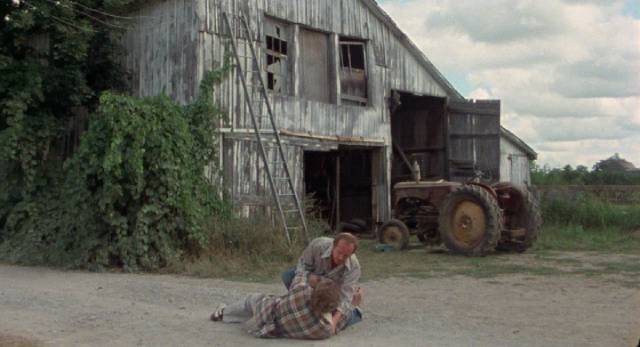
Dan finds Al with the now-dead Janet, believing what Fred had told him, a belief reinforced when he quickly discovers that there’s nothing wrong with the car and Al obviously could have driven Janet somewhere to get help. Although unwilling to believe Al’s obviously wild story about Fred being dangerous, and having waited an inordinate amount of time for the police to show up, Dan finally decides to return to the farm, holding the rifle on Al as he drives.
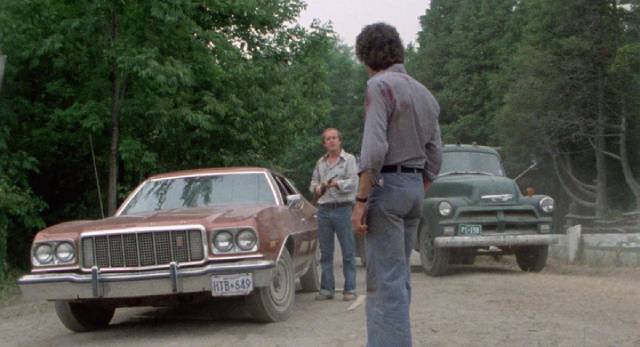
By this time, Laura has realized that Fred is not what he seems (despite his elaborate scheme, he has messed up by leaving evidence that he disabled the phone) and as they struggle for control of a gun, she’s injured by a bullet creasing her forehead. She flees the house with Fred in pursuit. By this point, there’s no rational plan. Fred is acting moment by moment out of desperation and when Dan and Al show up in the truck, the violence escalates. Having so far been a passive killer, letting Janet’s injuries run their course, he’s now active, using the farmer’s weapons. And Al, just an ordinary guy who finds himself in an insane situation, is finally driven to take violent action himself – a decision which leads to a horrific mistake.
The film ends in a mess of bloody confusion, with the police trying to sort out Al and Fred’s conflicting accounts of what happened.
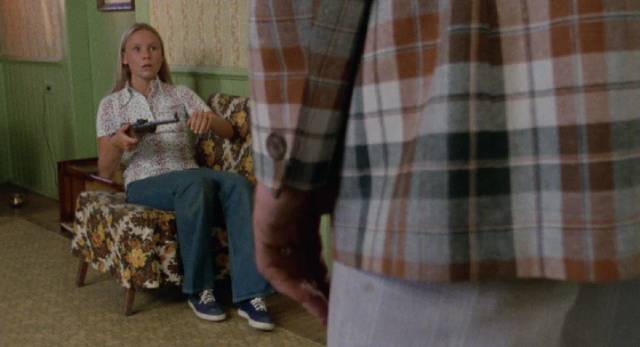
Everything that happens in Sudden Fury is contingent and reactionary; the characters are not in control and if they do try to shape events it goes badly. In the end, this lack of clear agency is what makes it virtually impossible for Detective Polanski (Sean McCann) to discern which of the two men might be telling the truth. Perhaps this refusal to provide clear narrative closure is the most Canadian thing about the movie – a recognition that reality doesn’t always offer certainty, and that even the well-intentioned can mess up in very bad ways and the innocent may pay a terrible price when they try to do the right thing.
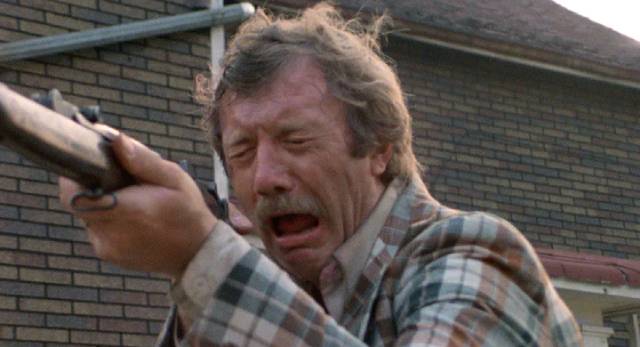
Shot on 16mm, the film looks surprisingly good in Vinegar Syndrome’s 2K restoration from the original camera negative. There’s fairly heavy grain, as you’d expect, but there’s a lot of detail in the image – which really brings out the horror of the mid-’70s clothes, particularly Fred’s garish jacket and shoes. The cinematography of James B. Kelly and editing of David Nicholson serve Damude’s script well; the film is very lean and tightly focused, with all the actors adding interesting little details to give the narrative a touch of psychological depth.
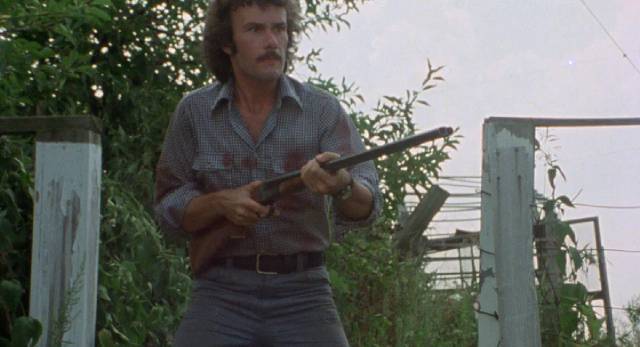
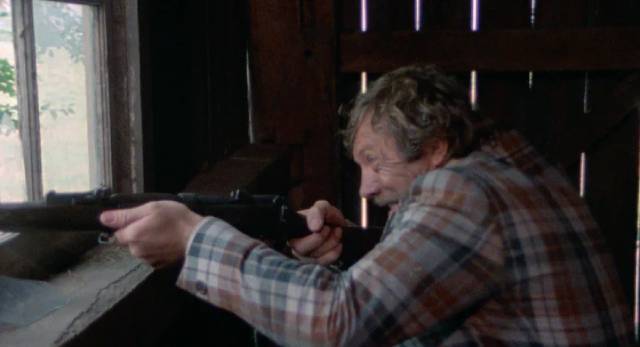
Made with a grant from the Canadian Film Development Corporation and Damude’s personal savings, Sudden Fury was apparently successful both critically and commercially and even provided some of the impetus for the drafting of the tax shelter legislation which arrived shortly after its release. But for some reason it didn’t have much of an afterlife when home video arrived a few years later. Vinegar Syndrome’s disk release (in 2018) was something of a rediscovery.
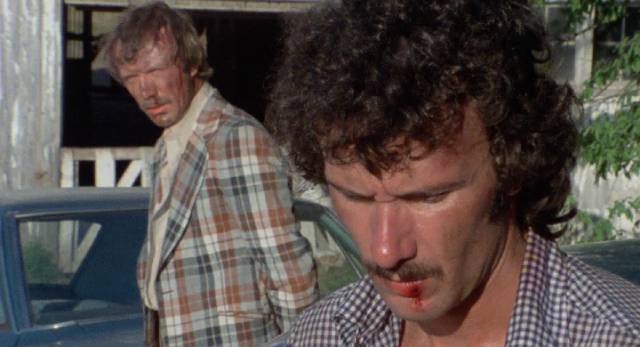
The disk includes a lively commentary with Damude in conversation with Peter Kuplowsky, who helped to bring the film back from oblivion. Damude has a lot to say about the mechanics of making a low-budget thriller back when film production was not well supported in Canada. He’s honest about his own limitations as a first-time feature director and about what he owed to his cast and crew in getting the film made. He discusses the period fashions and the refusal of either of the male leads to shave off their moustache. He also talks about his lack of success in launching a follow-up project – he wrote a number of scripts, including one he sold to Hollywood, none of which went into production – and then accepting a lucrative teaching position at Ryerson University in Toronto.
Like the Gold Ninja Video release of Skip Tracer, this Vinegar Syndrome disk is a valuable piece of Canadian cinema archaeology.
Comments
I watched Rupert play Maigret November last year and really enjoyed them. Rupert was good and I liked the supporting cast quite a bit. Nice production values for TV of the time and plenty of French scenery. I think I still like the Bruno Creme series better, I almost want to watch them over again but I have so much to watch as it is.
Yeah, I’ll probably get around to rewatching some of the Cremer films, but not the entire series! I spent an entire month watching nothing but…
That should be Bruno Cremer.